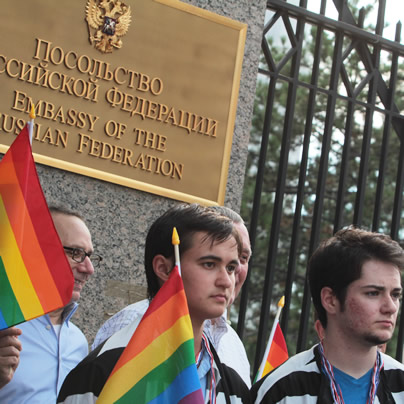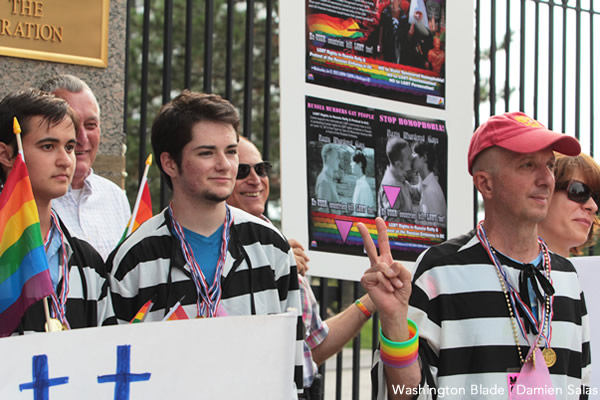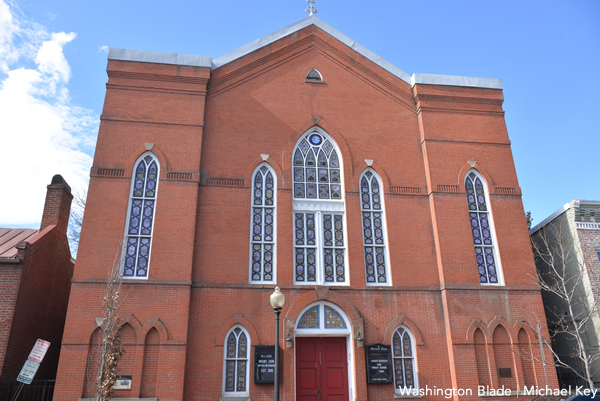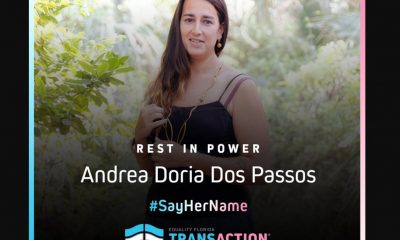News
Miss Universe Organization criticizes Russia LGBT rights record
Statement comes after Andy Cohen said he will not co-host pageant in Moscow


Protesters gathered outside of the Russian Embassy on Wednesday, July 31, 2013. (Washington Blade photo by Damien Salas)
The Miss Universe Organization on Tuesday expressed concern over a law that bans gay propaganda to minors in Russia and the ongoing anti-LGBT crackdown in the country.
“The Miss Universe Organization believes in equality for all individuals and is deeply concerned by the laws recently enacted in Russia and currently in place in several other countries,” it said in a statement GLAAD released. “Both the law, as well as the violence experienced by the LGBT community in Russia, are diametrically opposed to the core values of our company. Our organization has always embodied a spirit of inclusion and is a celebration of people from all countries and walks of life.”
The statement comes less than a week after Andy Cohen told E! News he turned down a request to co-host the 2013 Miss Universe pageant that will take place in Moscow in November, in part, because “he didn’t feel right as a gay man stepping foot into Russia.”
Francesco Pascuzzi, a gay man from Somerville, N.J., urged the Miss Universe Organization that Donald Trump co-owns with NBC Universal, in a Change.org petition to relocate this year’s pageant from the Russian capital over the country’s LGBT rights record.
“It is our hope this year’s Miss Universe contest in Moscow will help foster a common understanding and appreciation of the rights of all individuals, regardless of their nationality, race, religion or sexual orientation,” the Miss Universe Organization statement said.
Cohen could not be reached for comment.
Trump’s representatives last week did not return the Blade’s request for an interview.
“While I appreciate the Miss Universe Organization’s concern over Russia’s anti-gay policy, statements alone won’t protect gay staff and fans traveling to the pageant,” Pascuzzi said in a statement.
Growing outrage over the country’s gay rights record threatens to overshadow the 2014 Winter Olympics that will take place in Sochi, Russia, in February.
Russian chess champion Gary Kasparov and playwright Harvey Fierstein are among those who have called for a boycott of the Sochi games. Author Dan Savage, LGBT rights advocate Cleve Jones and others have called for a boycott of Russian vodka.
Gay Olympic diver Greg Louganis, who was unable to compete in the 1980 Summer Olympics in Moscow because then-President Jimmy Carter boycotted them over the Soviet Union’s invasion of Afghanistan the year before, is among those who feel the U.S. should compete in the Sochi games. President Obama, retired tennis champion Martina Navratilova and a coalition of LGBT advocacy groups that include Outsports.com and Athlete Ally also oppose an Olympic boycott.
Figure skater Johnny Weir, whose husband is of Russian descent, told CBS News earlier this month he is “not afraid of being arrested” while at the Sochi games.
American runner Nick Symmonds criticized the gay propaganda ban after he competed at the World Athletic Championships in Moscow last week. High jumper Emma Green Tregaro and sprinter Mao Hjelmer, who are from Sweden, painted their fingernails in rainbow colors as they competed in the same event.
The Miss Universe Organization said in its statement the “safety of our contestants, staff and crew is of the utmost importance.” It added it continues to work with “our Russian hosts to ensure the security and well-being of those traveling to Russia for the pageant.”
GLAAD said it plans to urge the Miss Universe Organization to continue speaking out against the gay propaganda law and anti-LGBT violence in Russia.
“Miss Universe is an organization with incredible impact all around the globe,” GLAAD spokesperson Omar Sharif, Jr., said. “Following this important first statement, Miss Universe has a unique opportunity to continue to speak out against the anti-LGBT violence and laws in Russia and demonstrate that the international community does not support Russia’s anti-LGBT brutality.”
National
United Methodist Church removes 40-year ban on gay clergy
Delegates also voted for other LGBTQ-inclusive measures

The United Methodist Church on Wednesday removed a ban on gay clergy that was in place for more than 40 years, voting to also allow LGBTQ weddings and end prohibitions on the use of United Methodist funds to “promote acceptance of homosexuality.”
Overturning the policy forbidding the church from ordaining “self-avowed practicing homosexuals” effectively formalized a practice that had caused an estimated quarter of U.S. congregations to leave the church.
The New York Times notes additional votes “affirming L.G.B.T.Q. inclusion in the church are expected before the meeting adjourns on Friday.” Wednesday’s measures were passed overwhelmingly and without debate. Delegates met in Charlotte, N.C.
According to the church’s General Council on Finance and Administration, there were 5,424,175 members in the U.S. in 2022 with an estimated global membership approaching 10 million.
The Times notes that other matters of business last week included a “regionalization” plan, which gave autonomy to different regions such that they can establish their own rules on matters including issues of sexuality — about which international factions are likelier to have more conservative views.
Federal Government
Republican state AGs challenge Biden administration’s revised Title IX policies
New rules protect LGBTQ students from discrimination

Four Republicans state attorneys general have sued the Biden-Harris administration over the U.S. Department of Education’s new Title IX policies that were finalized April 19 and carry anti-discrimination protections for LGBTQ students in public schools.
The lawsuit filed on Tuesday, which is led by the attorneys general of Kentucky and Tennessee, follows a pair of legal challenges from nine Republican states on Monday — all contesting the administration’s interpretation that sex-based discrimination under the statute also covers that which is based on the victim’s sexual orientation or gender identity.
The administration also rolled back Trump-era rules governing how schools must respond to allegations of sexual harassment and sexual assault, which were widely perceived as biased in favor of the interests of those who are accused.
“The U.S. Department of Education has no authority to let boys into girls’ locker rooms,” Tennessee Attorney General Jonathan Skrmetti said in a statement. “In the decades since its adoption, Title IX has been universally understood to protect the privacy and safety of women in private spaces like locker rooms and bathrooms.”
“Florida is suing the Biden administration over its unlawful Title IX changes,” Florida Gov. Ron DeSantis wrote on social media. “Biden is abusing his constitutional authority to push an ideological agenda that harms women and girls and conflicts with the truth.”
After announcing the finalization of the department’s new rules, Education Secretary Miguel Cardona told reporters, “These regulations make it crystal clear that everyone can access schools that are safe, welcoming and that respect their rights.”
The new rule does not provide guidance on whether schools must allow transgender students to play on sports teams corresponding with their gender identity to comply with Title IX, a question that is addressed in a separate rule proposed by the agency in April.
LGBTQ and civil rights advocacy groups praised the changes. Lambda Legal issued a statement arguing the new rule “protects LGBTQ+ students from discrimination and other abuse,” adding that it “appropriately underscores that Title IX’s civil rights protections clearly cover LGBTQ+ students, as well as survivors and pregnant and parenting students across race and gender identity.”
Rehoboth Beach
Former CAMP Rehoboth official sentenced to nine months in prison
Salvator Seeley pleaded guilty to felony theft charge for embezzlement

Salvator “Sal” Seeley, who served as an official with the Rehoboth Beach, Del., CAMP Rehoboth LGBTQ community center for 20 years, was sentenced on April 5 by a Sussex County Superior Court judge to nine months in prison and to pay $176,000 in restitution to the organization.
The sentencing took place about five weeks after Seeley pleaded guilty to a charge of Theft in Excess of $50,000 for allegedly embezzling funds from CAMP Rehoboth, a spokesperson for the Delaware Department of Justice told the Washington Blade.
Seeley’s guilty plea came shortly after a grand jury, at the request of prosecutors, indicted him on the felony theft charge following an investigation that found he had embezzled at least $176,000 from the nonprofit LGBTQ organization.
“Salvatore C. Seeley, between the 27th day of February 2019 and the 7th day of September 2021, in the County of Sussex, State of Delaware, did take property belonging to CAMP Rehoboth, Inc., consisting of United States currency and other miscellaneous property valued at more than $50,000, intending to appropriate the same,” the indictment states.
“The State recommended a sentence of two years of incarceration based on the large-scale theft and the impact to the non-profit organization,” Delaware Department of Justice spokesperson Caroline Harrison told the Blade in a statement.
“The defense cited Seeley’s lack of a record and gambling addiction in arguing for a probationary sentence,” the statement says. “Seeley was sentenced in Superior Court to a nine-month prison term and to pay a total of $176,000 in restitution for the stolen funds,” Harrison says in the statement.
Neither Seeley nor his attorney could immediately be reached for comment.
At the time of Seeley’s indictment in February, CAMP Rehoboth released a statement saying it first discovered “financial irregularities” within the organization on Sept. 7, 2021, “and took immediate action and notified state authorities.” The statement says this resulted in the investigation of Seeley by the state Department of Justice as well as an internal investigation by CAMP Rehoboth to review its “financial control policies” that led to an updating of those policies.
“As we have communicated from day one, CAMP Rehoboth has fully cooperated with law enforcement,” the statement continues. “At its request, we did not speak publicly about the investigation while it was ongoing for fear it would jeopardize its integrity,” according to the statement. “This was extremely difficult given our commitment to transparency with the community about day-to-day operations during the recent leadership transition.”
The statement was referring to Kim Leisey, who began her job as CAMP Rehoboth’s new executive director in July of 2023, while the Seeley investigation had yet to be completed, following the organization’s process of searching for a new director. It says Seeley left his job as Health and Wellness Director of CAMP Rehoboth in September of 2021 after working for the organization for more than 20 years.
“Mr. Seeley’s actions are a deep betrayal to not only CAMP Rehoboth but also the entire community we serve,” the statement says.















